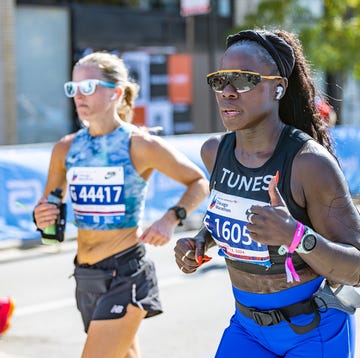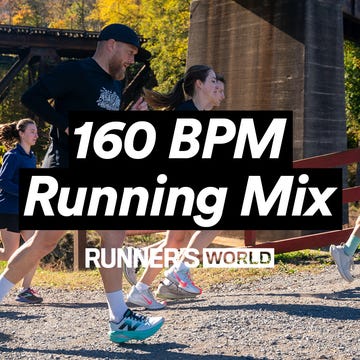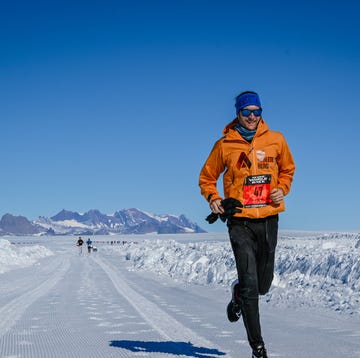Kayla Montgomery is a disciplined runner. If her plan says, “run for 35 minutes” she’ll run around the parking lot until her watch hits 35:00. She’ll push it in workouts and do long runs on Sundays. Running, to her, is a personal journey.
“She doesn’t run to get a scholarship. She doesn’t run to get trophies. She doesn’t run to win,” said her coach Patrick Cromwell. “It’s a personal journey for her.”
Montgomery, 18, is a senior at Mount Tabor High School in Winston-Salem, North Carolina. She’s been on the track and cross-country teams since her freshman year and has risen to become one of the team’s star athletes.
Montgomery, New York Times on the front page of the A Pro Athlete Takes on The Great World Race on March 4, was diagnosed with multiple sclerosis (MS) three years ago after falling during a soccer game. An MRI revealed six lesions on her brain and spine, but after being prescribed medication she went into remission and many of her symptoms were reversed.
However, one of the most prominent symptoms, numbness in her legs, will likely never be reversed. Whenever she races hard, Montgomery’s legs go numb, but that doesn’t stop her from running.
“I still wanted to run because I didn’t want anybody to know what was wrong,” Montgomery said in an interview with Runner's World Newswire. “I just wanted to keep going on with my life.”
When she told Cromwell of her diagnosis she said, “I think I can run really fast and I want to keep trying.” Cromwell began to increase her mileage and workouts as he would any other inexperienced freshman runner on the team and she started to get faster.
“She’s really not treated any different,” Cromwell said.
During very intense workouts and in the last mile or so of races, Montgomery begins to experience the numbness in her legs, a symptom of her MS. Sometimes she even falls at the finish line and her coach or a designated teammate will catch her.
“We catch her because we don’t want her to break her collarbone,” Cromwell said. “She doesn’t know where her legs are coming into the finish of a race. It's safety for her.”
Questions have been raised as to whether or not Montgomery’s condition has given her a competitive advantage but Cromwell thinks it’s more of a mental advantage than anything.
“I think your whole body wants to quit with one mile to go in a 5K,” he said. “Trust me, she is hurting just like everyone else from the waist up.”
Cromwell said he thinks Montgomery’s MS gives her strong motivation to run as fast as she can because she doesn’t know when she won’t be able to anymore.
“Part of what helps me keep my mental edge is I’ve grown to be at peace with my situation and I’ve accepted the fact that my mobility is not really guaranteed,” Montgomery said. “I’ve just decided to make [sure] I’m able to keep running the best that I can and make the most out of what I’m able to do still.”
Over the past 15-20 years research has found exercise, both aerobic and anaerobic, to be extremely beneficial for people with MS.
“At one time people with MS were discouraged from doing any exercises either from the belief that they couldn’t do it or they would hurt themselves,” said Dr. Nicholas LaRocca, vice president of Health Care Delivery and Policy Research at the National MS Society. “That changed probably through research that showed the benefits of exercise for people with MS.”
LaRocca said exercise can help individuals with MS improve their cardiovascular health and stave off fatigue.
“Fatigue is a major problem for people with MS but cardiovascular exercise can help improve fatigue levels of MS patients,” he said.
Besides the physiological benefits of exercise, LaRocca said those with MS can benefit from improved quality of life, mood, and higher energy levels. For Montgomery, whenever she takes time off from running like during a break or the off-season, she feels grumpy.
“I feel like when I run I’m the most happy and my mom has always told me when you feel good you do much better,” Montgomery said. “I feel like if I’m running and I’m happy I’m also helping my MS get a little better.”
While exercise does offer many benefits to people with MS, LaRocca said right now there’s no research indicating it can alter the course of the disease.
“I think that although exercise is encouraged among people who have MS there’s really no way at this point to say it’s going to alter the course of the disease,” he said. “I think that there are many people with MS who have felt that it has made a difference in their life as opposed […] leading a more sedentary lifestyle.”
Montgomery doesn’t plan on giving up her intense exercise regimen any time soon. She will run the 5000 meters at the national indoor track championships in New York on March 14 and will go on to attend Lipscomb University in Tennessee in the fall on scholarship.
“I just hope that she continues on this journey and continues to stay one step ahead of MS and enjoy that freedom [running] gives us,” Cromwell said.
For more information about ongoing research regarding MS, visit the National MS Society website.

Hannah is a former Social Media Editor for Runner’s World. Hannah started running in February 2012 with a Couch-to-5K program and less than seven months later ran her first half-marathon. You can follow Hannah on Twitter @byHannahMcG.













